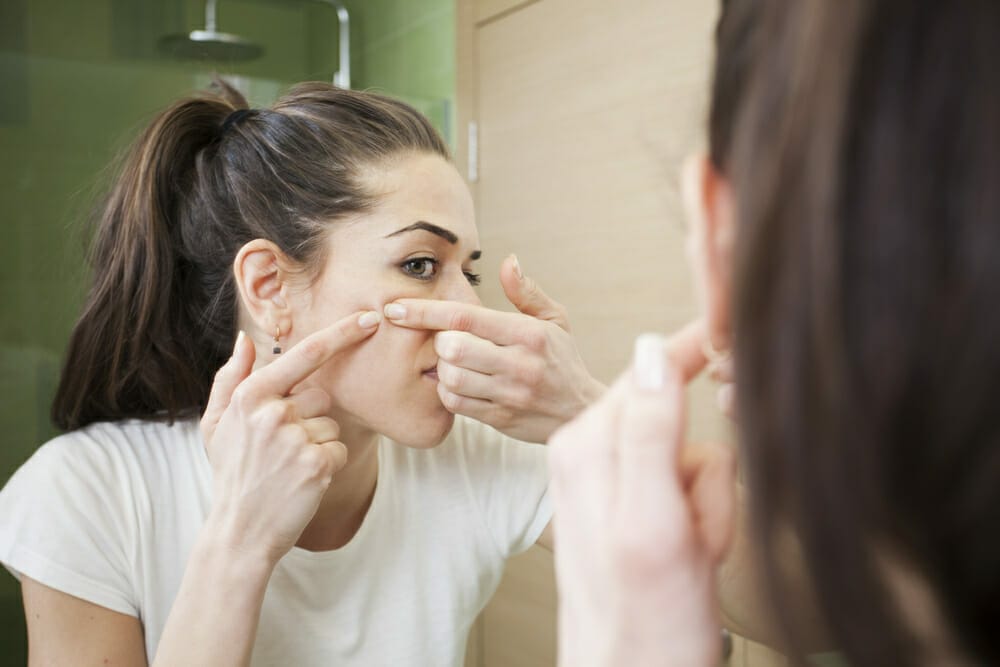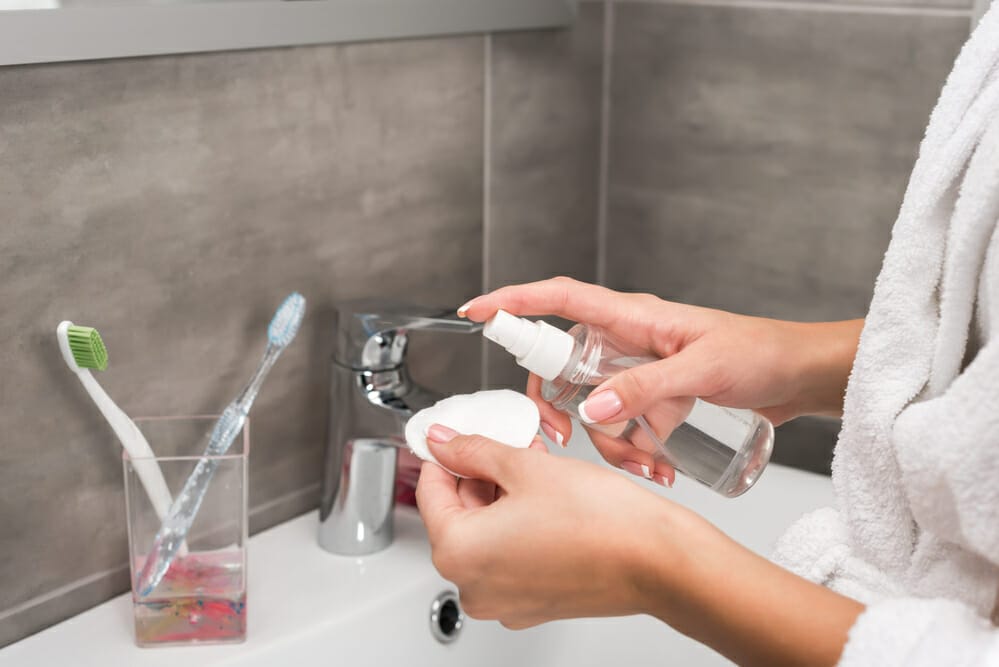Acne skin is one of the most demanding skin types. It is characterized by excess sebum, constantly appearing pimples and blackheads, frequent inflammations and, in more serious cases, chronic purulent changes.
In acne skin care, the most important thing is systematic exfoliation of dead skin cells, skin toning and thorough cleansing (in the morning and in the evening) with the use of cosmetics adequate for our skin type. Interestingly, we can also take care of our acne complexion from the inside by providing the body with ingredients stimulating body toxin removal.cleansing the body from toxins which are many times responsible for imperfections in the form of pimples, papules and discolourations. Find out how to take care of acne skin!
Table of contents
Acne skin – characteristics
Although it is said that acne skin is a domain of adolescence, also after puberty, in adulthood, many people struggle with more or less severe acne. Both among younger and older people, it is a big aesthetic problem. Fortunately, proper care of acne skin in most cases brings satisfactory results. When starting the battle for clean and smooth skin, it is worth to find out the causes of acne changes. Some of them can be eliminated, thus reducing skin problems.
Acne skin – the causes of the phenomenon. What is the basis of acne changes?

There are several factors responsible for acne vulgaris, the main ones being:
- genetic predisposition – in this case excessive sebum secretion, abnormal work of the sebaceous glands and disorders of the cornification process leading to the formation of pimples are individual characteristics written in the genes, most often inherited from parents or grandparents;
- hormonal background – in this case blackheads, cysts, papules, pimples appear as a result of rapid hormonal changes occurring in the body (this type of(this type of acne is mainly associated with adolescence, when there is an intense secretion of sex hormones);
- mechanical factors – as a result of skin damage (e.g. excessive sunlight), sebaceous glands overgrow, which results in excessive production of sebum and the formation of skin lesions, such as papules, nodules, swellings
- lifestyle factors – excessive use of stimulants, too many simple sugars in the diet, too much highly processed food and food containing a lot of chemical additives (these factorschemical additives (these factors cause the accumulation of toxins in the body and their “ejection” on the skin in the form of eruptions);
- stress – excess of the stress hormone in the body, i.e. cortisol, may result in excessive activity of the sebaceous glands and intensification of acne lesions;
- disease and drug background – in this case acne changes are a result of disease (e.g. polycystic ovary syndrome) or the use of certain medications (e.g. contraceptive pills, anabolic steroids, anti-tuberculosis drugs);
- Factors associated with improper facial care – in this case, overproduction of sebum and skin changes are responsible for our care omissions such as: too weak or too intensive facial cleansing, lack of make-up, lack of proper skin moisturizing, use of low quality and allergenic cosmetics, use of too oily and too heavy cosmetics clogging the pores (e.g. containing vegetable oils or oils that are not suitable for the skin), use of cosmetics that are too drying for the skin. The use of too oily and too heavy cosmetics clogging the pores (e.g. containing vegetable oils or silicones);
- infectious basis – in this case acne develops as a result of infection by bacteria Propionibacterium acnes, P. granulosum, P. avidum or fungi Malassezia furfur.
Check: Acne Pills – Ranking
How to recognize acne skin?
In case of acne skin, we deal with constant appearance of skin changes and inflammations causing redness, skin inflammation, unpleasant burning sensations and discomfort.
The most frequently observed imperfections accompanying acne skin are: enlarged pores, pimples, blackheads (whiteheads), papules, nodules, swellings, purulent cysts.
The texture and appearance of acne skin is also characteristic. The face skin is oily, slightly sticky, shining (especially on the nose, forehead and chin). It is devoid of smoothness and uniform color, in many areas it has a reddish tint. Most often there are numerous bumps on it, and significant areas of the face are occupied by pimples.
All these imperfections are the result of excessive production of sebum (sebum ) by the sebaceous glands, as well as disorders of the keratinization process and the malfunction of hair follicles. The outlets of sebaceous glands get clogged by excess sebum and dead skin, which results in the formation of blackheads (open or closed). Often anaerobic bacteria proliferate, inflammation develops, pimples, cysts and painful thickening appear.
The problematic aspect of acne skin (besides frequent occurrence of pimples and inflammation) is also the fact that skin lesions have a tendency to heal with difficulty and leave permanent scars. This is a big aesthetic problem. Therefore, the use of preparations with regenerative properties is very important in the care of acne skin.
What is the difference between acne and oily skin?
Both acne and oily skin are characterized by seborrhea, i.e. overproduction of sebum by the sebaceous glands. As a result, both types of skin are characterized by oiliness and shine.
However, in case of acne-prone skin excessive keratinization of epidermis and continuous plugging of sebaceous glands and formation of persistent pimples, nodules and blackheads occur additionally. Fewer unsightly and difficult to solve imperfections makes it easier to deal with oily skin than with acne-prone one.
Acne skin care

When caring for problematic skin, including acne skin, choosing the right cosmetics is very important. However, well-chosen cosmetics are not everything; regularity of our skin care is equally important.
In the morning and in the evening we thoroughly cleanse our face and apply appropriate creams. In the case of increased problems with skin inflammation, seborrhea and eczema, also during the day we wipe the face with a mild tonic to refresh, additional cleansing and disinfection. It is also a good idea to exfoliate from time to time. What products should be used for acne skin care?
Cosmetics for acne-prone skin
Acne cream
If you have acne-prone skin, you should first of all avoid greasy and heavy creams, as they may additionally intensify the phenomenon of sebaceous gland blockage and sebum retention.
For the day we should choose a cream with a light consistency, with mattifying and moisturizing properties. A good day cream for acne skin simultaneously prevents shine (or reduces it to a large extent) and prevents excessive water loss from the skin and strengthens the hydrolipidic barrier (and thus protects against irritation, soothes and calms, combats itching and burning).
At night we should use delicate creams designed for problematic and sensitive skin, in which, apart from moisturizing ingredients, there are also substances with regenerative and smoothing properties, stimulating collagen and elastin production (such as: vitamin C, vitamin E, allantoin, zinc, hyaluronic acid, vitamin A).
At night we can also use a mild cream showing antibacterial and anti-inflammatory effects (e.g. with clay, green tea extract, AHA acids, calendula, chamomile).
Face cleanser for acne-prone skin
Many people with acne-prone skin mistakenly reach for the strongest possible facial cleansers. In contact with aggressive substances (e.g. alcohol, glycol, strong detergents), the skin becomes dry, irritated, red, burning and stinging. The natural hydrolipid mantle is violated and the exfoliation process is too intensive. As a consequence, the sebaceous glands produce even larger amounts of sebum and skin problems worsen.
Instead of using aggressive products, it is better to choose milder ones, which do not cause irritation or water loss but also do not lack properties crucial for acne skin. Delicate foams with cleansing properties, removing excess of sebum, antiseptic, refreshing and at the same time slightly matting and calming the skin will be the best choice.
Toners for acne-prone skin
Toning is a very important element of acne skin care. Wiping the face with tonic refreshes the complexion, cleanses pores and gets rid of excessive skin greasiness. We also fight harmful microorganisms and normalize skin pH. Similarly as in case of face cleanser, also toner for acne skin cannot be accidental.
Aggressive, skin-irritating toners will not do. Mild tonics, containing plant extracts (e.g. birch bark extract, cucumber extract, burdock extract, aloe vera) and floral waters (rose water, lavender water) are recommended. A good tonic for acne-prone skin cleanses the skin, restores its balance, helps remove dead epidermis, inhibits bacterial proliferation, but does not dry out and does not burden the skin.
Peelings for acne-prone skin
It is worth to have a peeling once in a few days, which will remove the excess of sebum, exfoliate keratinized epidermis, get rid of impurities and unblock pores. We should remember that clogged pores are more prone to inflammation and acne changes are more frequent. Peelings are an effective tool for unblocking pores. We can use mechanical, enzymatic or chemical peelings according to our preferences and needs of our skin.
Additional advice for people with acne-prone skin
- From time to time it is worth to make yourself a homemade face mask with the use of natural ingredients with cleansing, bactericidal, antibacterial properties.It is worth from time to time to make yourself a homemade face mask using natural ingredients with cleansing, antibacterial as well as skin regeneration stimulating, smoothing and soothing properties. Proven and effective ingredients of home-made masks for acne skin include: arnica, apple cider vinegar, aloe vera, tea tree oil, linseed, natural yoghurt, turmeric, chamomile, nettle, yeast, cinnamon.
- It is worth using special dietary supplements for problematic skin that fight bacteria and inflammation, stimulate repair processes in the skin and normalize the work of the sebaceous glands (e.g. Zinamax).
- It is also worth taking care of a healthier lifestyle, which will certainly be appreciated by our skin.give up or cut down on stimulants, switch to a healthy, natural diet, avoid processed foods, avoid polluted environments and become more resistant to stress.
- Once in a while it is worth doing a detox of the body consisting of vegetable shakes, special herbal mixtures and cleansing diet or treatment with a dietary supplement detoxifying the body (e.g. Spirulin Plus, Detoxyn).

